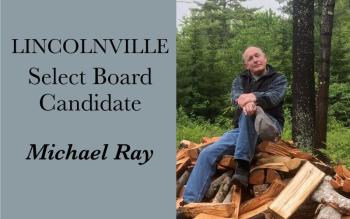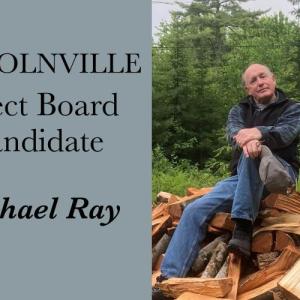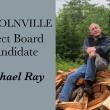On the issues: Lincolnville Select Board Candidate Michael Ray
On June 13, voters in Lincolnville will elect two citizens from a slate of three candidates to serve on the Lincolnville Select Board. There are two open seats this June, both three-year terms. Candidates are Jean Botley, incumbent Michael Ray and Robyn Tarantino.
Penobscot Bay Pilot has posed questions to each candidate, providing the opportunity for the public to better understand their position on issues important to the town and region. Here, Michael Ray discusses his position on various topics.
Please provide a short biography of yourself.
I’m 66, having moved to Midcoast Maine from Ohio in 1989. For the last 22 years I’ve lived in Lincolnville. I’ve worked a variety of jobs in the area: rigging work at a boatyard, counseling developmentally disabled adults in our community, guiding kayak camping trips around the Bay, restaurant work, public transportation, and building the house my wife Barbara and I live in. Right now I’m pretty much retired – which means I seem to get paid less for working more hours.
I’ve also enjoyed the privilege of serving on some Lincolnville Town boards and committees: formerly the Planning Board, Land Use Committee, and Broadband Committee; currently the Selectboard, the Conservation Commission, and the newly-formed Heart and Soul initiative. I’m also on the Board of the Belfast Senior College, the Legislative Policy Committee of the Maine Municipal Association, and for the last few years have been splitting and schlepping firewood for the Waldo County Woodshed.
What are the three most pressing issues facing Lincolnville today, and how would you like to see them resolved?
Three years ago, I answered this same question with COVID as the number one concern. While the pandemic moved off the front burner, that long experience sadly reminded us that people’s health and livelihoods are not things to take for granted. (And – maybe off topic, here — it’s important to thank Lincolnville’s residents, town staff and school personnel for getting the town through that period with a minimum of disruption.) Now, I tend to think the big three might be: Dwindling levels of civic engagement; figuring out how Lincolnville can best work regionally on some issues; and, the ever-present infrastructure needs.
Civic Engagement: Lincolnville is very fortunate in having excellent people as employees and volunteers. Still, the Town struggles to keep participation in community affairs and governance strong and fresh. I’d like to see Lincolnville more aggressively encourage and assist volunteerism. We might want to try some traditional approaches like Town Meeting potlucks and story-swapping combined with newfangled dives into town-wide digital literacy, broadband access and improved online municipal communications.
Regional approaches to problem solving: Not every problem Lincolnville faces stops at the Town Line - and there’s a lot to be said for economies of scale, not re-inventing the wheel, etc. The Town is already involved in some very fruitful inter-local agreements, and times seem right to consider more conversations along these lines. In the last few years we’ve seen opportunities come up in the form of regionally-focused organizations and models that provide planning, technical assistance, and access to funding. I hope the Town looks into these.
Infrastructure: Taxpayers simply share the ownership of a LOT of stuff: roads, buildings, parks, and – maybe the sexiest of all municipal possessions — seemingly miles of culverts. None of these things are getting any younger, and continued maintenance – though sometimes costly – is just plain prudent. I think the Town is doing a great job keeping up here, but I also think it needs to keep a strong focus on making sure people’s money is spent wisely in routine maintenance and related policy.
Damaging coastal storms and rising ocean levels are a reality now. Flooding may become more constant and affect private and public properties. How should the town address rising ocean, lake and river levels?
I tend to think this is one of those realities that people around here will eventually meet and successfully cope with. But we sure aren’t going to deal with changing weather by ignoring its effects. Lincolnville has what I think is good groups of people looking at vulnerable areas, whether they’re sections of shoreline, invasive species affected by rising temperatures, or inland culverts. The Town has started to inventory these areas, look at funding opportunities around, for example, community resiliency, and is exploring some regional initiatives. Policies that convert “looking” into actionable results need to happen of course, and I’m confident that it will.
With Lincolnville’s population increasing, how should the town address housing pressures.
I don’t see how housing is going to properly get addressed without concerted and authentic regional and Municipal-State partnerships. LD 2003, and Lincolnville’s recent work to comply with that, is a (perhaps lopsided) toe-dip into towns and the State working together to address housing needs. But smaller, local efforts are a necessary ingredient, as well. That’s where the vitality and passion to solve this issue lies. There’s plenty of talent in our town able to take advantage of some of the many innovative ideas out there. A “land bank”, for example, isn’t doing anybody any good if there’s no people to run it.
How will you protect the Lincolnville taxpayer as you shape and govern a municipal budget, and juggle various interests that request municipal funding throughout the year?
While on the Select Board I’ve been through three budget cycles, and in each one you realize that balancing the needs and values of the community while spending your neighbor’s money is a solemn responsibility. So you listen hard to others on the board, look hard at the data coming from expert sources, hear people’s arguments why money should be expended for their interests – and hope that you come up with a reasonable and responsible expense of funds. And accept the reality that not everyone is going to be happy.
How do you envision the future of solid waste processing for the four towns; i.e., recycling, waste stream reduction?
I tend to think that “top down” economic incentives and policies combined with personal responsibility will direct the future of waste management in our area. So at the town level we keep on eye on these — along with markets, technology and budgets — to try and manage costs and balance them with environmental responsibilities. All the time aware that Maine generally is running out of disposal space, and towns are devoting larger and larger portions of their budgets to dealing with waste disposal. (And of course we find out every few years that what we’ve been tossing out is more and more toxic and pernicious.) My time on the Selectboard has convinced me that Lincolnvilles’s association with Mid Coast Solid Waste has been working well. It’s a fiscally responsible and environmentally-focused outfit run by committed people. And MCSWC is one of those regional efforts that simply gets things done.
As the Midcoast continues to grow its outdoor and recreational economy, more people and visitors will be boating on lakes and ponds, hiking, and biking. How do you hope to balance demand with environmental protection?
I think that keeping this area environmentally healthy means continued education on the importance of personal responsibility and connection to nature, simply leaving no trace, regular and thorough resource monitoring, and some common sense regulation.
Should Union 69 (Lincolnville, Appleton and Hope K-8) consider dissolving and joining with Camden and Rockport for a regional school unit that would comprise the five towns and incorporate public education K-12?
This is another area where I’m still very much learning, but without just punting the football... I’d say that its a communities-wide decision trying to reaching that balance between earlier education close to where children live vs costs to taxpayers. Even if its just “administratively close.” So while there’s some fundamental tie-ins between towns and schools – and the separately elected boards of both need to work together so those go smoothly — what the people want is going to decide the issue.
What is your favorite place in Lincolnville?
I’d sound like a politician if I said “It’s all good” so I guess my favorite spot in town is within a couple feet of my woodstove. Though it’s hard to beat simply getting out there.
Free space to offer additional thoughts!
Thanks for the chance to get some thoughts out. And thanks for doing what local journalism does so well – keeping us informed on important decisions that we make in our neck of the woods. To anyone thinking about voting next week, I’d simply encourage them to please go ahead. Vote however — there’s plenty of reasons to make one’s voice heard. (And if you vote AND volunteer, there’s probably a special reward waiting for you somewhere down the line.)





























